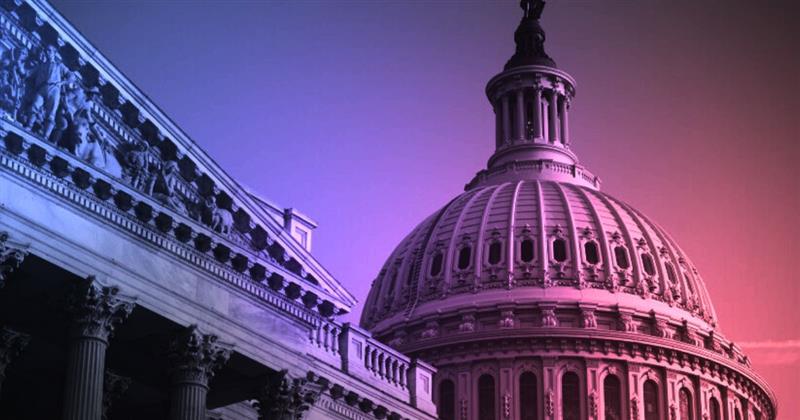As Joe Manchin and other independents recently emphasized, restoring trust in government requires breaking free from partisan incentives and embracing accountability.
The Big Picture
In recent days, various proposals to ban members of Congress from trading stocks have gained momentum. One bill from Sens. Josh Hawley (R-MO) and Gary Peters (D-MI) passed out of the Senate Committee on Homeland Security and Governmental Affairs. Another from Rep. Tim Burchett (R-TN) has become the subject of a discharge petition that Rep. Anna Paulina Luna (R-FL) has vowed to push forward in the House once the chamber returns from the August recess.
Lawmakers and high-level officials routinely have access to nonpublic information through committee hearings, private briefings, interactions with high-level executives of corporations, and other avenues. This information is not available to ordinary investors like you or me, creating simply undeniable conflicts of interest and uneven playing fields when it comes to personal gain.
Zooming In
The result of this? Deteriorating confidence in democratic institutions. The public should be concerned that government officials may put themselves at a personal advantage over ordinary citizens due to the information they have access to. They should also be wary that government officials may prioritize their personal interests over the broader public good when it comes to legislation affecting industries in which they have a vested stake, for one reason or another.
Now, it’s worth noting that existing laws are already on the books that address this issue, at least in theory. The STOCK Act of 2012 banned insider trading by Congress; however, proving such intentionality is very difficult, and thus enforcement of the law has been less than effective. In fact, investigations into the 2020 pandemic-era trades that raised eyebrows did not result in charges against members for violating federal securities laws, despite clear patterns of questionable timing. Going beyond reporting of trades, as required by the STOCK Act, will be necessary to fully and effectively address the underlying issue.
Additionally, polling consistently shows overwhelming support for stricter rules governing the stock trading activities of public officials. A recent survey found that 86% of Americans support banning members of Congress from trading individual stocks, and 87% support the same for the president, vice president, and Supreme Court justices. These results cut across party lines and to independent voters too, with all groups overwhelmingly in support. This aligns with findings from the Independent Center’s polling, which show that independent voters overwhelmingly prefer bipartisan cooperation and accountability over partisan gamesmanship. Two other polls from the year prior put these numbers for members of Congress at 63% and 80%, respectively, indicating that support for a broad ban is only increasing as time goes on.
The mandate for Congress is clear from the people: they are elected to serve the people, not their own interests, and should not personally benefit from their public roles.
We have already covered the two proposals currently active in congressional committees and in media discussions; however, several other proposals would make significant strides toward truly addressing this deep-seated problem. One such proposal from Sens. Jon Ossoff (D-GA) and Mark Kelly (D-AZ), the Ban Congressional Stock Trading Act, would require public officials (as well as their spouses and their dependent children) to place individual stock holdings in blind trusts in order to insulate them from influence or from the appearance of conflict. Although not an outright ban, this type of approach still demonstrates a desire to get at the root of the problem.
Going further is a proposal in the House, the Bipartisan Restoring Faith in Government Act, which would fully prohibit members of Congress, spouses, and dependents from trading, selling, and owning individual financial stocks. Going even further is the latest version of the formerly-named Preventing Elected Leaders from Owning Securities and Investments (PELOSI) Act from Sen. Josh Hawley (R-MO), which would now — with a substitute amendment — apply a full ban on stock trading to the president and vice president as well, albeit not the current president.
That caveat sparked a familiar round of grievance from Trump, who accused the bill’s sponsors of targeting him—even though it wouldn’t apply to his administration. He took to Truth Social to lambast Hawley, whom he called a “second-tier Senator.” Ironically, that accusation proves the point: trust in government depends on accountability without exception.
In fact, the Hawley legislation would be strengthened by including the current president and his administration, as the president already supports it. As Sen. Rand Paul (R-KY) put it, “I will oppose the substitute change because I think it should apply to everybody, or nobody. To exempt Donald Trump from this is crazy.”
He’s right. Carveouts undermine credibility. Any serious reforms must apply universally and without political gamesmanship. This is about restoring public service to its rightful place, not as a path to personal enrichment, but as a platform for public good and commitment to principle.
Prohibiting officials from holding stocks not only removes temptation to act impurely but also helps to restore trust in elected officials and aligns with public expectations of their leaders. The STOCK Act was a start, but with more than a decade of track record, it is clear that it did not go far enough. Now, public pressure and bipartisan reform efforts in both chambers of Congress offer a new chance to further overhaul a broken system. It is time to restore public trust and ensure that holding public office remains about public service to the country, not personal profit.
Independent Lens
As Joe Manchin and other independents recently emphasized, restoring trust in government requires breaking free from partisan incentives and embracing accountability. Independent voters—now 43% of the electorate—are demanding it.
And as the Independent Center warns in its analysis of executive overreach, Congress must reclaim its constitutional responsibilities—not just to check the presidency, but to model ethical leadership across all branches of government.



.jpg)

